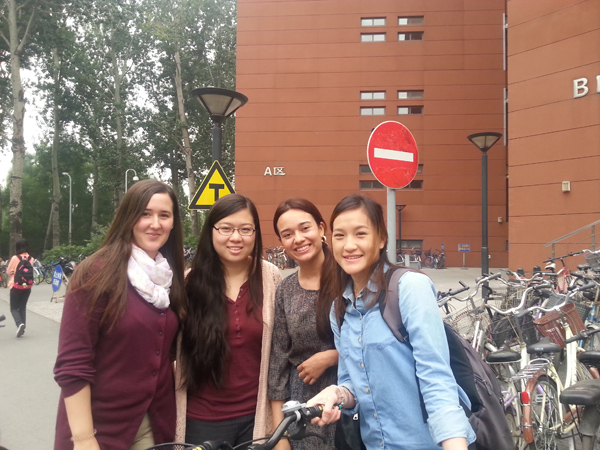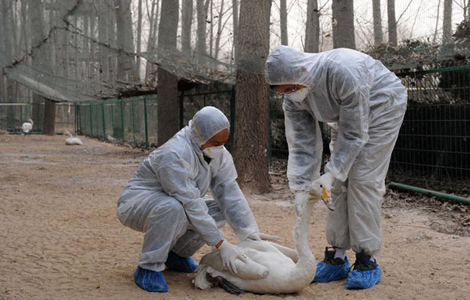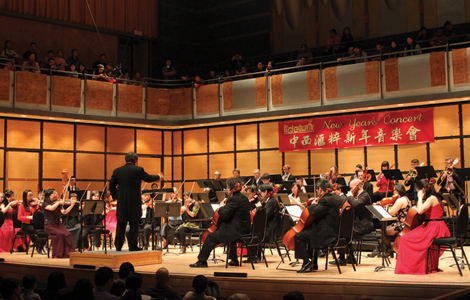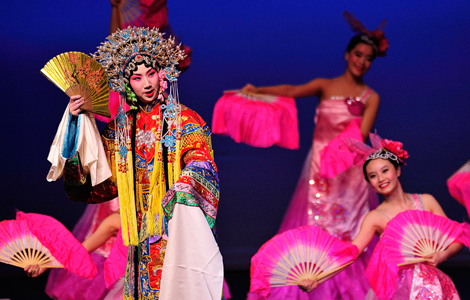LatAm students reflect on study in China
Updated: 2015-01-19 04:49
By HUA SHENGDUN in Washington(China Daily Latin America)
|
||||||||
 |
|
Colombian student Laura Chavarro (second from right) with her classmates after class at Tsinghua University in Beijing in this photo taken in September 2014. PROVIDED TO CHINA DAILY |
After a semester in Beijing, Laura Chavarro set out on a break to Shanghai, hoping to delve further into Chinese culture.
"I'm very happy here," Chavarro said. "It's totally different from Western countries, so it's a good opportunity to study and to know more people and different opinions and everything."
Chavarro, who is from Colombia, was admitted by the Tsinghua University Department of International Relations, one of the top higher-learning institutions in China. She said she had great expectations before landing and enjoyed the "amazing experience to study here".
"I was motivated by the methodology and the Chinese system," Chavarro said. "It's a very good opportunity for me to study here."
The first-year graduate student said her experience in China would help her in the future, after she earns a master's degree in foreign policy and international relations in Beijing.
"I would go back to my country after graduation, where I plan to work in a Chinese company or for our government," she said.
More students will come to study in China as the Chinese government will provide 6,000 scholarships to the Community of Latin American and Caribbean States (CELAC) in the next five years, according to the latest cooperation plan issued by the first ministerial forum between the two sides on Jan 16.
Chinese President Xi Jinping announced at the opening ceremony of the forum in Beijing that 6,000 people will get educational training in China, and 400 more will be able to study as on-the-job graduates.
The forum was intended to "promote more cooperation between China and Latin America beyond the areas of just trade and finance", Anthony Elson, adjunct professor of international economics at the Johns Hopkins School of Advanced International Studies, told China Daily.
The two-day forum, announced during Xi's visit to Brazil in July, enabled Latin America to take a ride on the Chinese "express train" to development, according to the Xinhua News Agency.
Costa Rica President Luis Guillermo Solis, Ecuador President Rafael Correa Delgado, Bahamas Prime Minister Perry Christie and Venezuela President Nicolas Maduro Moros attended the meeting.
"This initiative and the program of student exchange are consistent with China's interest in forging and strengthening economic, social and political ties among countries of the South," Elson said.
Along with technology, infrastructure, finance and investment, education builds cooperation between the two sides.
"Education is an important part of building a strong long-term relationship," said Evan Ellis, research professor of Latin American studies at the US Army War College Strategic Studies Institute.
"It helps forge relationships of confidence and trust with the future business and political leaders and other key actors in the region," Ellis told China Daily.
He said it deepened the knowledge of China among Latin Americans and in the Caribbean as well, which allows for "more effective relationships and business projects, business risk assessments, and other benefits".
Spanish and English-language courses were established on Chinese campuses, with more Chinese-language courses, including Confucius Institutes, set in Latin America.
A 10-year program called the "Bridge to the Future" will also facilitate education exchange for young leaders from both countries.
China and the Organization of the American States (OAS) signed two agreements in December, with the Chinese government increasing its pledge for the cooperation fund and scholarships.
OAS Secretary General Jose Miguel Insulza said last year that the mutual operation has "made significant contributions that we renew today".
Insulza praised China's role in the region and its support to the Washington-based intercontinental organization's activities, including child education.
"The political implications have to do with the strengthening of the relationship between China and the region," Ellis said. "But whether it is good or bad depends on how that knowledge and closer relationship is used."
"My family is proud of me and supports me in my decisions," said Natalia Marriaga Martínez, a second-year graduate student from Colombia at Tsinghua University. She is paying her own way for her studies in China.
"They are firm believers in the power of education to improve oneself and hope I can attain more success through this," she said.
Having lived in China for two and half years, Martínez said studying there would be a "wonderful and magical experience".
"Being here opens your eyes and world view, gives you much needed patience, allows you to immerse yourself in a different and deeply rooted culture," she said.
"There still seems to be a lack of structural organization in my programs," Martínez said. "Perhaps that could improve to really push the programs' quality."
Great potential also exists in education exchange between China and Latin American countries. Of the 360,000 international students who went to China in 2013, a small percentage was from Latin America. Chinese students also traveled to Latin American area.
Tong Ying, a Spanish major at Harbin Normal University, studied at Universidad ORT, Uruguay, from 2012 to 2013. After graduating in China in 2014, she found work as an interpreter in Latin America.
"The overseas study in Montevideo really broadened my horizon," Tong said.
Sheng Yang in Washington contributed to this story.

 Trending: Tuckered out panda goes viral
Trending: Tuckered out panda goes viral
 Govt takes measures after 93 wild birds die
Govt takes measures after 93 wild birds die
 Perfect China cruises into Asia Cup quarterfinals
Perfect China cruises into Asia Cup quarterfinals
 Jay Chou, Hannah Quinlivan get married in UK
Jay Chou, Hannah Quinlivan get married in UK
 HK donor gives $1 million to NYPD officers' families
HK donor gives $1 million to NYPD officers' families
 Across Canada Jan 16
Across Canada Jan 16
 Chinese piece headlines Carnegie recital
Chinese piece headlines Carnegie recital
 Across Americas Over the Week (Jan 9-Jan 15)
Across Americas Over the Week (Jan 9-Jan 15)
Most Viewed
Editor's Picks

|

|

|

|

|

|
Today's Top News
China's civil servants to see 60% increase in salary
Hundreds of Chinese trapped by fighting in eastern Myanmar
Dec home prices fall in China
China's renewable energy use ranks top in the world
Getting overseas strategies right
HK donor gives $1 million to NYPD officers' families
Congresswoman warns of immigration scams
Silicon Valley will mark Spring Festival
US Weekly

|

|







